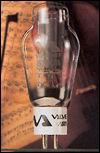| Columns Retired Columns & Blogs |
LATEST ADDITIONS
|
Nov 28, 1999 |
0 comments
It would seem that every generation remembers the good ol' days of music, before the kids turned it all into mush. Or is that just a fallacy proven wrong by every new release?
Do you think music (any genre you prefer) is getting better, worse, or staying the same? Please explain.
Much better
7% (10 votes)
A little better
18% (24 votes)
Staying the same
25% (34 votes)
A little worse
21% (28 votes)
Much worse
29% (39 votes)
Total votes: 135






